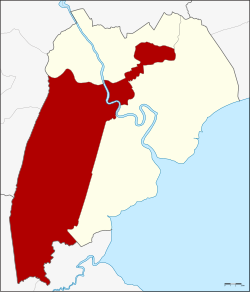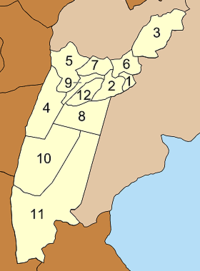Amphawa district
Amphawa
อัมพวา | |
|---|---|
 | |
 District location in Samut Songkhram province | |
| Coordinates: 13°25′29″N 99°57′26″E / 13.42472°N 99.95722°E | |
| Country | Thailand |
| Province | Samut Songkhram |
| Seat | Amphawa |
| Area | |
• Total | 170.164 km2 (65.701 sq mi) |
| Population (2017) | |
• Total | 55,602 |
| • Density | 326.68/km2 (846.1/sq mi) |
| Time zone | UTC+7 (ICT) |
| Postal code | 75110 |
| Geocode | 7503 |
Amphawa (Thai: อัมพวา, pronounced [ʔām.pʰā.wāː]) is a district (amphoe) of Samut Songkhram province, at the northwestern tip of the Bay of Bangkok (upper Gulf of Thailand).
Geography
[edit]Neighboring districts are (from the north clockwise) Bang Khonthi and Mueang Samut Songkhram, Ban Laem and Khao Yoi of Phetchaburi province, Pak Tho and Wat Phleng of Ratchaburi province.
The Mae Klong River flows through the northern part of the district.
Amphawa is regarded as the largest district in the province.
History
[edit]In the Ayutthaya period, the area of Amphawa was known as Khwaeng Bang Chang (or just Bang Chang), a small agricultural and commercial community. During the reign of King Prasat Thong the existence of a market is confirmed by sources.
In early Rattanakosin period, Bang Chang was dubbed "Suan Nok" (outer garden), paired with "Suan Nai" (inner garden) or Bangkok. Because they have a very similar terrain, which was filled with orchards and there was many watercourses flowing through the areas.
In those days, the territory of Bang Chang extended to parts of Bang Khonthi, Mueang Samut Songkhram Districts and Damnoen Saduak District in Ratchaburi Province in present day.
The name "Bang Chang" meaning "place of elephants", because it used to be a habitat for many herd of wild elephants and was also a hideout for the white elephants as well. While "Amphawa" after the canal Khlong Amphawa that runs through the district. This word "Amphawa", it is assumed to mean "mango forest" in order to reflect the condition of the area in those days which was full of various orchards such as mango etc. Hence the seal of the district is an elephant in the mango forest.[1]
In 1766, the later King Buddha Loetla Nabhalai (Rama II) was born in the area, as his father was serving as governor of Ratchaburi at that time. At his birthplace is now a memorial park with four buildings in the traditional style of that area, displaying art as well as lifestyle of that time.[2]
Administration
[edit]The district is divided into 12 sub-districts (tambons), which are further subdivided into 96 villages (mubans). Amphawa itself as well as Mueang Mai have sub-district municipality status (thesaban tambon). There are also 11 tambon administrative organizations (TAO).
|

|
Notable people
[edit]In addition to King Buddha Loetla Nabhalai, there are still many people born in Amphawa:
- Queen Amarindra: Queen consort of King Phutthayotfa Chulalok (Rama I) and mother of King Buddha Loetla Nabhalai
- Luang Pradit Pairoh: traditional Thai musician
- Eua Sunthornsanan: singer, composer and bandleader of Suntaraporn band
- Toon Tongjai: famous lukthung (Thai country song) singer
Attractions
[edit]Chuchai Buri Sri Amphawa ('the city of Chuchai in the glory of Amphawa') is a billion baht entertainment complex 500 m from the floating market that features an 18-room hotel, shopping centre, restaurant, and Hindu shine. The building is an outrageous mix of Thai traditional and neoclassical, reminiscent of high society during the late-19th and early-20th centuries. It was built by a wealthy Thai gemstone dealer and designer, Chuchai Chairitthilert, who was bewitched by Amphawa.[4]
Amphawa Floating Market is an afternoon/evening food market held on Fridays, Saturdays, and Sundays on the canals close to Wat Amphawan Chetiyaram.[5]
King Rama II Memorial Park is four traditional Thai houses. It is arranged in the ethnology style, representing the artifacts in the early of Rattanakosin era that reflects the characteristic of the art and culture, the livelihood, and the living of Thais in the period of King Buddha Loetla Nabhalai. Located next to Amphawa Floating Market.[2]
See the Fireflies popular in the evenings is a boat ride around the waterways to see fireflies.
Wat Bangkae is a temple in Amphawa. It is divided into two temples, Wat Bangkae Noi and Wat Bangkae Yai. It was created by the major wife and minor wife of Royal Sang Wongsaroj (Chao Phraya Surasak).[6][failed verification] The major wife was the founder of Wat Bangkae Yai. On the wall, it says "On a Sunday in May in 1173 Chula Sakarat, Chao Phraya Surasak (Governor Samuhapraklaopm) and wife built this temple". Wat Bangkae Noi is on the Maeklong River. This temple was founded by Royal Sang Wongsaroj and his minor wife (Jui Wongsaroj).[7][failed verification] Inside, the temple is made of golden teak wood. The wood was carved with a biography of Lord Buddha,[8] by workers and sculptors from Phetchaburi. They took around 10 years to carve the wood and build the temple. The temple also contains a statue of Somdej Toh which is interesting[9] because Somdej Toh is well-respected among Buddhists. People who visit Amphawa often pay homage to Somdej Toh.[10] In addition, communities around the temples surrounded by Khlong Bangkae are also an agricultural and cultural tourism destination. It has resorts and guesthouses to serve tourists. Visitors can experience the way of life and farming of local people, such as gypsum.[11]
Siamese Cat Village is a traditional Thai wooden house that features exhibits on the four remaining breeds of Siamese cat — Wichien Maat, Korat, Suphalak, Korn Ja (include Khao Manee) combined, more than 130, as well as several real life cats that hang around the house and its surrounding gardens with cute coffee shop. It was run by a kamnan (community leader) who is now dead, but this house is still open for tourists to visit. Each year, there are as many as 800,000 visitors (mostly foreigners). Admission is free but donations are encouraged.[12][11]
References
[edit]- ^ Sanfah (2012-02-29). "พินิจนคร (Season 3) ตอน บางช้าง" [Pinijnakorn (Season3) ep Bang Chang]. TPBS (in Thai). Retrieved 2019-08-25.
- ^ a b "King Rama 2 Park". ThailandToursimDirectory.
- ^ "Population statistics 2017". Department of Provincial Administration. Archived from the original on 2018-04-05. Retrieved 2018-04-05.
- ^ Wangkiat, Paritta (2016-05-22). "A new hotel sparks fears all that glitters will be sold". Bangkok Post. Retrieved 22 May 2016.
- ^ "Amphawafloatingmarket.com". Archived from the original on 2017-05-17. Retrieved 2018-09-15.
- ^ "Phawat kwarm pen mar kong wat bangkae yai". Retrieved October 15, 2013.
- ^ "Watbangkaenoi". Archived from the original on September 23, 2013. Retrieved October 15, 2013.
- ^ Chillchan Milchan. Chillpainai: Sib Te Na Teal Mear Mar Amphawa "Wat bangkae noi" (August 18, 2013) Retrieved October 16, 2013, from http://www.chillpainai.com/scoop/738/
- ^ Bee Wa family (2013).Teal Sal Ar Tid Hok "Wat bangkae noi". Bangkok: Aksorn Sumpun.
- ^ PauLLiE. Painaidii: Ma Amphawa Tong Te Tam Ar Lai Kan De Na (January 25, 2012) Retrieved October 16, 2013, from http://www.painaidii.com/diary/diary-detail/000100/lang/th/
- ^ a b Paothong Thongchua (2016-09-03). "เปิดตำนานกับเผ่าทอง EP.124 ตอน สมุทรสงคราม" [Perd Tamnan Kap Paothong (Travel the World with Paothong) ep.124 Samut Songkhram]. PPTV HD (in Thai). Retrieved 2020-04-10.
- ^ "สิ้น"ปรีชา พุคคะบุตร" นักอนุรักษ์แมวไทยพันธุ์แท้" [The end of "Preecha Pukkabutr" purebred Thai cats conservationist]. Matichon (in Thai). 2018-04-03. Retrieved 2020-04-10.
External links
[edit]- amphoe.com (Thai)
